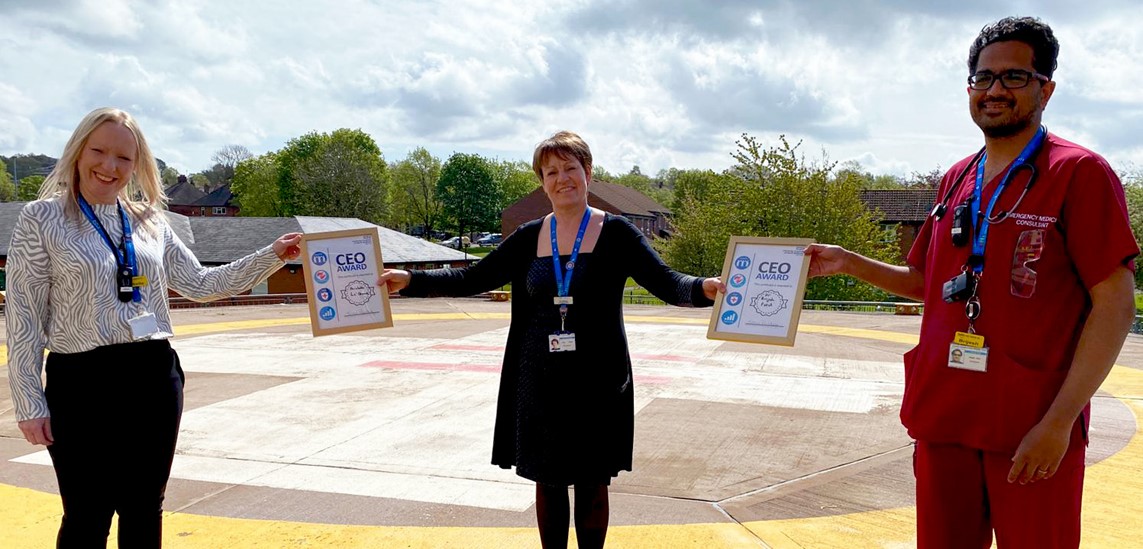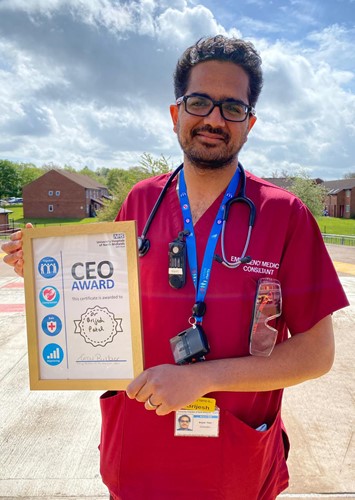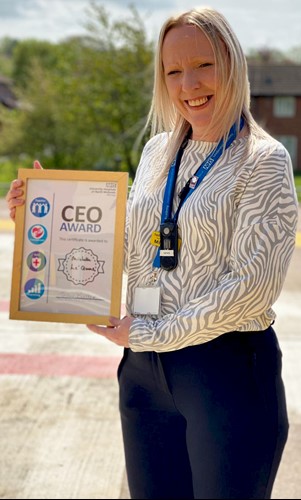Hands-free device enhancing A&E patient care

A hands-free device is helping emergency department staff to care for patients more effectively. The ‘Vocera’ communication system is worn as a badge on the front of a uniform and works by using the hospital’s WiFi to give staff instant voice communication with each other. It was funded as part of a grant from the Denise Coates Foundation in support of the hospitals’ response to the Covid-19 pandemic and benefits include improved patient flow, patient safety and satisfaction.
The team behind its installation have been given the Chief Executive’s Award for their tireless work in setting the system up.
Tracy Bullock, chief executive officer, said: “Brijesh and Michelle have worked tirelessly towards introducing Vocera. This has included designing all the pathways for calls to be directed, working with the external developers, the internal IT team with the electronic infrastructure and then introducing 300 devices. The effect has been to improve efficiencies in the way we deliver patient care and to improve staff morale.”
Vocera responds to voice commands and can be used to help with tasks such as dialling a phone number, receiving a call, playing voice messages, setting reminders or messaging a group of users. Devices can be worn under personal protection equipment and give staff access to clear, secure hands free communications channel that keeps staff safer and helps provide high quality patient care.
Future aims include using Vocera to track where patients are being treated more accurately and quickly, making the process easier for relatives and staff.
Dr Brijesh Patel, consultant in emergency medicine said: “Vocera makes contacting colleagues quicker and more efficient. We can instantly get in contact with the right person, rather than using the emergency buzzer which traditionally provides an ‘all or nothing’ response. All of this means care for our patients can be co-ordinated and provided quicker. We’ve all taken to it. Rather than having to wait for someone to call you can be proactive. You can tell someone you’ll be free in five minutes and ask them to call back.

Dr Brijesh Patel, consultant in emergency medicine
“It’s really nice to be acknowledged for the hard work we have done, although it is really all one big team effort. The whole concept of the chief executive’s award is that you are recognised from the very top of the organisation and I don’t think you see that in many other organisations. It’s amazing to receive this award.”
Michelle Le’Queux, business manager in emergency medicine, said: “We’re really excited about Vocera. We knew the changes it would make but seeing it actually happen has been amazing. The staff love it as it’s removed the need to use desk phones or pagers. If a staff member is wearing a device, then they can be contacted directly. Previously, a delay of even a few minutes could lead to frustration for staff and for patients. Now staff including doctors, nurses and porters can contact each other instantly either by name or role. It is very simple to use and very effective.

Michelle Le’Queux, business manager in emergency medicine
“It’s an honour to receive this award. For us it’s our day-to-day business so it’s very nice to be recognised. We have put a lot of hours into this project because we are passionate about our job and our patients.”